
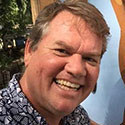
Chief Scientist, Marine Biologist, NOAA National Centers for Coastal Ocean Science
Dr. Peter Etnoyer is the chief scientist for Leg 1 of the Southeast Deep Coral Initiative (SEDCI) expedition aboard NOAA Ship Nancy Foster. He has been studying Gulf of Mexico deep-sea corals since 2003. Peter is a marine biologist and lead researcher for NOAA's deep-sea coral ecology laboratory at the National Centers of Coastal Ocean Science (NCCOS) in Charleston, South Carolina. He is also an adjunct professor at the College of Charleston. Peter graduated from Texas A&M University-Corpus Christi in 2009 and Duke University in 2001. His lab conducts deepwater benthic surveys to support habitat conservation and marine management in state and federal waters around the continental United States.
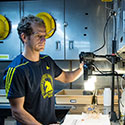
Expedition Coordinator, Research Coordinator, NOAA Southeast Deep Coral Initiative/JHT Inc.
Dr. Daniel Wagner is serving as the expedition coordinator and works as the research coordinator for the Southeast Deep Coral Initiative (SEDCI) at JHT Inc./NOAA National Centers of Coastal Ocean Science (NCCOS). Daniel has conducted research on deep-sea corals since 2006 and has participated in over 25 expeditions that have surveyed deepwater ecosystems throughout the Pacific Islands, Galapagos, Caribbean, Antarctica, the Chagos Archipelago, and the Gulf of Mexico. His research interests include the taxonomy, life history, and ecology of deep-sea corals, particularly black corals. Daniel received his Ph.D. and M.S. in biological oceanography from the University of Hawaii and a B.S. in Biology from Hawaii Pacific University. Daniel is originally from Ecuador, but resides in Charleston, South Carolina.
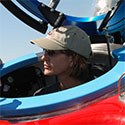
Associate Research Faculty, Florida State University Coastal and Marine Lab
Dr. Sandra Brooke was born in Farnham, just west of London, and after completing her undergraduate and M.S. degrees in England, worked in mosquito control in the Cayman Islands, where she learned to dive and discovered marine biology. Sandra then obtained an M.A. in Marine Biology from the Virginia Institute of Marine Science and a Ph. D. (2002) from the Southampton Oceanography Center, in the United Kingdom. Sandra’s research focuses on coral reefs in both shallow and deep waters, specifically understanding their distribution, abundance, and physiology, as well as how they are affected by anthropogenic (human) impacts. Her research uses underwater vehicles, benthic landers, and in situ experimentation to enhance our understanding of deep-sea coral biology, ecology, and vulnerability to disturbance. Sandra has studied reefs in the Gulf of Mexico, South Florida, the South Atlantic Bight, Mid-Atlantic canyons, the Aleutian Islands, and the Norwegian Fjords. Her role on this expedition is to assist in selecting dive sites for remotely operated vehicle surveys. Additionally, Sandra will be collecting live Lophelia pertusa specimens for studies on deep-sea coral reproduction.
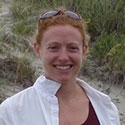
Coordinator, NOAA Deep Sea Coral Research and Technology Program
Dr. Heather Coleman coordinates the Deep Sea Coral Research and Technology Program within the NOAA Fisheries Office of Habitat Conservation. In this role, she enjoys working with researchers from around the country and helping to convey results to resource managers. On this expedition, Heather is excited to communicate progress, news, and results and to assist with operations in general. Prior to joining NOAA, Heather worked at the National Academy of Sciences, synthesizing best practices for monitoring restoration in the Gulf of Mexico, and at the Pacific Marine Analysis and Research Association, leading a capacity-building program on tools to facilitate marine spatial planning. Her Ph.D. research at the University of California, Santa Barbara, focused on ecological and demographic effects of natural oil seeps on marine invertebrate populations. Her M.A. research covered the history, politics, social dynamics, ecological effects, costs, and benefits of estuarine restoration in Istanbul, Turkey. Heather has also researched shallow-water coral reef community dynamics, ecological effects of marine debris, oceanic biogeochemical cycling, and invasive plant ecology and has led volunteer programs to restore kelp forests and clean the beaches of her home city, Los Angeles, California.
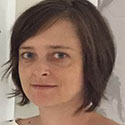
Research Biologist, Leetown Science Center, United States Geological Survey (USGS)
Dr. Katharine Coykendall is a research biologist at the USGS Leetown Science Center. Throughout her childhood, growing up in Pittman Center, Tennessee, she wanted to become a marine biologist. As an undergraduate student at the University of South Carolina, she narrowed her focus to studying population genetics of threatened and endangered marine species. She continued this trajectory at the University of California Davis, where she received her Ph.D. in genetics. Since then, Katharine has expanded her horizons to the deep sea, where she uses genetic and genomic tools to study population connectivity, levels of biodiversity, and cryptic diversity of invertebrates in cold-water and chemosynthetic communities. On the current expedition, she will collect samples of the deep-sea coral Lophelia pertusa to construct a transcriptome to act as a baseline for future gene expression studies, as well as samples for studies on gene flow and genetic diversity of cold-water corals and associated invertebrates.
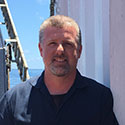
ROV Team Manager, Pelagic Research Services
Jesse Doren has over 20 years offshore ocean experience, including conducting and managing complex research and deck operations, as well as leading AUV and ROV projects. Jesse has served as lead and supervising marine technician, dive supervisor, and project manager for complex vessel operations, including the operation of working class and science class ROV systems with depth and operational capabilities up to 6,000 meters. During his career, Jesse has worked on a wide diversity of projects including seafloor survey projects, wreck surveys, search and recovery, oil and gas exploration, ROV system acquisition, and factory acceptance testing. As the ROV and operations manager for Pelagic Research Services, Jesse has direct oversight of the management of the operation and maintenance of the ROV Odysseus. He manages ROV staff and serves as the safety officer for all operations. He is also responsible for planning and implementing the mobilization and demobilization of the ROV system, and also serves as a senior ROV pilot, shift supervisor, and project manager while offshore.
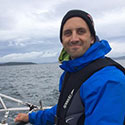
Hydrographic Surveyor, Pelagic Research Services
Jonathan Gallant is a Hydrographic Surveyor with Terra Remote Sensing Inc. on Vancouver Island in British Columbia, Canada. He graduated from McGill University in 2006 with a Bachelor's degree in East Asian Studies. In 2010, Jonathan completed the surveying program at the British Columbia Institute of Technology and has worked as a surveyor since then. At Terra Remote Sensing Inc., he focuses on providing marine mapping and technical solutions. On this expedition, Jonathan will provide navigation and positioning for the ROV team. Jonathan is originally from Rindge in the Monadnock region of Southern New Hampshire.
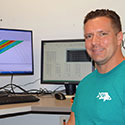
Geologic Oceanographer, University of South Florida
John Gray is currently the lead multibeam data processor for the Continental Shelf Characterization and Mapping Project (C-SCAMP) at the University of South Florida. He has extensive survey experience aboard various research vessels including the R/V Bellows and the R/V Weatherbird II. On this expedition, John will be processing newly collected bathymetry data and creating high-resolution bathymetry and backscatter maps, as well as other data products to support the mission. In addition to his work with C-SCAMP, John is also pursuing a Master of Science in Geological Oceanography from the University of South Florida College of Marine Science. John earned an undergraduate degree from the University of New Orleans in Earth and Environmental Science concentrating in coastal processes and restoration. The ocean and coast have been a big part of John's life since he was young, even becoming an ocean lifeguard through high school and college. It was not until his first science class at the University of New Orleans that he realized that his experience as an ocean lifeguard could be applied to a science degree. John lives in Saint Petersburg, Florida where he enjoys kiteboarding, surfing and serving the community on the Pinellas County Parks and Conservation Resources Advisory Board.
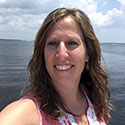
Research Ecologist, NOAA National Marine Fishery Service, Panama City Laboratory
Stacey Harter is a research ecologist with the NOAA Fisheries Laboratory in Panama City, Florida. She received her Bachelor's degree in Biological Sciences from Florida State University in 1999, and a Master's degree in Marine Sciences from the University of South Alabama in 2002. Since working with NOAA, she has focused her research on mesophotic and deep coral ecosystems. She is the lead investigator for a project examining a network of deep-water marine protected areas (MPAs) in the U.S. South Atlantic. That project monitors changes in habitat and fish populations over time, as well as compares areas inside MPAs to those located outside them, in order to determine if they are an effective management tool. On this expedition, Stacey will help identify and quantify fish species assemblages observed during remotely operated vehicle dives. Stacey is originally from the small town of Mohawk in upstate New York.
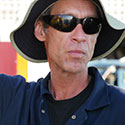
ROV Pilot/Technician, Pelagic Research Services
Erik Hodges has worked in the subsea industry for the past 10 years, and has been involved with many different types of projects that have taken him to explore deep-sea habitats around the world. He has worked in the subsea industry for 10 years, on many different project around the world. Assisting with work for NOAA, Erik also participated in sub-sea work following the Deepwater Horizon oil spill. On this expedition, Erik will serve as ROV pilot and technician and looks forward to broadening his experience into the research side of subsea operations.

ROV Pilot, Pelagic Research Services
Kris Ingram is an ROV pilot and technician currently working out of Neptune Beach, Florida. He began his career in 2006 after studying at the Naval Nuclear Power Training Command and serving aboard the USS John F. Kennedy (CV-67). After working primarily in the oil and gas industry, he has recently been afforded new opportunities to work in the science sector, such as on this expedition with NOAA.
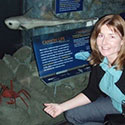
Fishery Biologist, Gulf of Mexico Fishery Management Council
Dr. Morgan Kilgour has been a fishery biologist at the Gulf of Mexico Fishery Management Council since 2013. She earned both a M.S. in Biology and a Ph.D. in Coastal and Marine System Science at Texas A&M University-Corpus Christi, and a B.S. in Marine Biology from the University of California at Santa Cruz. Her research interests include biodiversity, spatial management, marine ecology, deep-sea benthic ecology, and the reproductive biology of marine species. On this expedition, Morgan will assist in identifying decapods, as well as disseminate data to the Gulf of Mexico Fishery Management Council for management considerations. Morgan grew up in a small town outside of Sacramento, California.
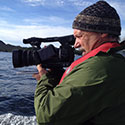
Creative Director, Green Fire Productions
Ralf Meyer co-founded Green Fire Productions as a nonprofit organization in 1989 with the mission to use the power of film to move audiences to action, as well as to educate decision makers on pressing environmental and social issues. Over the last 30 years, Green Fire Productions has produced dozens of award-winning films on conservation and sustainability issues ranging from protection of wildlands, salmon restoration, dam removal, the ecological role of top predators, and ocean conservation. Their latest project, Ocean Frontiers , is a film series that showcases ocean stewardship in action throughout North America. On this expedition, Ralf will serve as the expedition videographer and produce a series of short videos for outreach and education.
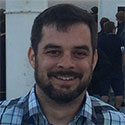
Spatial Ecologist, NOAA National Centers for Coastal Ocean Science
Matt Poti is a spatial ecologist with the NOAA National Centers for Coastal Ocean Science. He received a B.S. in Biology and B.A. in Chemistry from the University of Richmond and a Master of Environmental Management degree from Duke University. In his seven years with NOAA, Matt has used spatial and statistical analyses and modeling of ecological data to inform a wide range of marine resource management and spatial planning priorities. Recently, he has been involved in the development of statistical models that identify areas likely to have suitable habitat for deep-sea corals in the U.S. Atlantic, the Gulf of Mexico, and the Main Hawaiian Islands. On this expedition, Matt will use information from existing habitat suitability models and high-resolution bathymetric data to assist with survey planning. Matt currently resides in Frederick, Maryland.
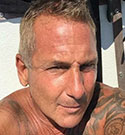
ROV Pilot/Technician, Pelagic Research Services
Paul Sancore is a 10-year United States Navy veteran who served honorably and with distinction, as he was repeatedly selected as the lead ROV pilot for high-visibility recovery missions while stationed at Undersea Rescue Command (formally Deep Submergence Unit). Since separating from the Navy, Paul has continued to serve on projects of national and international interest. As vessel superintendent, he aided in the recovery of those lost and trapped aboard the Japanese fishery training vessel, Ehime Maru. Paul also participated in efforts to contain the flow from the Macondo blowout (Deepwater Horizon) and helped with environmental impact studies after the flow was contained. On this expedition Paul will perform duties as pilot and technician of the ROV Odysseus for Pelagic Research Services. Paul is originally from North Bellmore on Long Island, New York.

Expedition Coordinator, Research Coordinator, NOAA Southeast Deep Coral Initiative/JHT Inc.
Dr. Daniel Wagner is serving as the expedition coordinator and works as the research coordinator for the Southeast Deep Coral Initiative (SEDCI) at JHT Inc./NOAA National Centers of Coastal Ocean Science (NCCOS). Daniel has conducted research on deep-sea corals since 2006 and has participated in over 25 expeditions that have surveyed deepwater ecosystems throughout the Pacific Islands, Galapagos, Caribbean, Antarctica, the Chagos Archipelago, and the Gulf of Mexico. His research interests include the taxonomy, life history, and ecology of deep-sea corals, particularly black corals. Daniel received his Ph.D. and M.S. in biological oceanography from the University of Hawaii and a B.S. in Biology from Hawaii Pacific University. Daniel is originally from Ecuador, but resides in Charleston, South Carolina.

Education Specialist, Children's Museum of the Lowcountry
Originally from Homestead, Florida, Evalynn is a recent graduate from the College of Charleston, where she received a Bachelor's degree in Geology. Evalynn is highly devoted to the Benthic Acoustic Mapping and Survey (BEAMS) program at the College of Charleston. Currently, Evalynn works as an education specialist at the Children's Museum of the Lowcountry in Charleston, South Carolina. On this expedition she will be helping to process multibeam data, as well as CTD data.
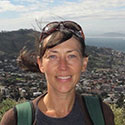
Biologist, JHT Inc./NOAA National Centers of Coastal Ocean Science
Rachel Bassett received her B.S. in Marine Biology and her M.S. in Environmental Studies, both from the College of Charleston. During her master's work, she completed an internship at the South Carolina Department of Natural Resources with a focus on conservation biology, fisheries management, and marine protected areas. She is passionate about anything that will help protect ocean resources. On this expedition, Rachel will help with processing mapping data.
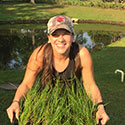
Master's Student, Bethune-Cookman University
Mallory Brooks is originally from Tampa, Florida. She graduated with her Bachelor’s in Environmental Science from Stetson University in 2015, while also playing for Stetson’s softball team. Mallory currently serves as a graduate assistant at Bethune-Cookman University in NOAA’s Center for Coastal and Marine Ecosystems, pursuing a Master’s of Science in Integrated Environmental Science. Her Master’s thesis will focus on the roles of habitat restoration, living shorelines, and their roles in nutrient sequestration. She is heavily involved with a local environmental education non-profit, the Marine Discovery Center, where she assists with community and student education, coastal restoration and native plantings, water quality testing, and habitat surveys.
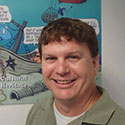
Biologist, South Atlantic Fishery Management Council
Dr. Chip Collier is a biologist for the South Atlantic Fishery Management Council (SAFMC), where he is the staff lead for the coral and shrimp fishery management plans, as well as the system management plans for marine protected areas. The data collected during this expedition will be considered in management of coral and fisheries that interact with it, as well as provide information for use in a future system management plan for the SAFMCs coral habitat area of particular concern. Prior to his work with the SAFMC, Chip worked with the North Carolina Division of Marine Fisheries for 15 years. During that time, Chip also worked on his Ph.D. in Marine Biology at the University of North Carolina Wilmington. Chip currently resides in Charleston, South Carolina.
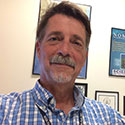
NOAA's National Centers of Environmental Information
Dr. Scott Cross represents NOAA’s National Centers for Environmental Information (NCEI), the nation’s long-term archive for oceanographic, geophysical, and climate data. Scott is an oceanographer with a broad background in the Earth sciences: he earned a B.S. in geology from the University of Alabama, an M.S. in geological oceanography from Texas A&M, and a Ph.D. in paleoclimate from Duke. He spent a total of 11 years as a civilian oceanographer with the U.S. Navy before joining NCEI in 2005. Through the years, Scott has been involved with geological surveying and sampling around the world, including the North Atlantic and North Pacific Oceans, the Persian Gulf and Arabian Sea, the East China Sea, and even Lake Titicaca. Scott’s focus with NOAA is scientific data management, with an emphasis on data to delineate, describe, and assess marine ecosystems. Scott will sail as a data manager and mapper.

College of Charleston
Rachel Fein, originally from Wayne, Pennsylvania, and is a recent graduate from the College of Charleston. Rachel studied geology and hopes to have a future career in hydrography. This is her first time participating on a research expedition and she will be working as a scientist helping with post-processing of mapping data.
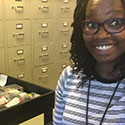
Benthic Ecologist, Department of Environmental Affairs, South Africa
Zoleka Filander is from the rural east coast of South Africa. She has a background in marine taxonomy and is currently appointed as the offshore benthic ecologist with the South African Government at the Department of Environmental Affairs in Cape Town. Zoleka is also currently pursuing a Ph.D. at the Nelson Mandela University investigating the taxonomy and biodiversity patterns of South African stony corals. She has an interest in coral taxonomy, conservation, and marine spatial planning. Her roles on this expedition range from assisting with processing mapping data, producing maps, and collecting water samples for studies on seawater carbonate chemistry.
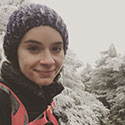
Sea Grant Knauss Fellow, U.S. Department of State Office of Marine Conservation
Leah Fine is a Sea Grant Knauss Fellow with the Office of Marine Conservation at the U.S. Department of State, where she works on on a broad range of international issues concerning living marine resources. She also has several years of experience in domestic and international fisheries management with nonprofit organizations including the Conservation Law Foundation, the Gulf of Maine Research Institute, and the Environmental Defense Fund. Leah holds a Master's in Environmental Science and Management degree from the Bren School at the University of California, Santa Barbara, and a B.A. in Geology and Environmental Studies from Amherst College. Her undergraduate research, conducted during a summer fellowship at the Woods Hole Oceanographic Institution, reconstructed a 3,000-year record of hurricanes from sediment cores collected in a harbor on Cape Cod. Her master's research evaluated hydrogeologic and economic considerations for developing a program to offset the impacts of new groundwater use in the Bozeman, Montana area. This expedition will be her first time at sea. Leah is originally from Brookline, Massachusetts, and currently lives in Washington, DC.
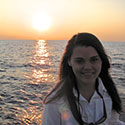
Knauss Marine Policy Fellow, NOAA Office of International Activities
Katie Geddes is a 2017 Knauss Marine Policy Fellow at NOAA Research, working in the Office of International Activities. Katie engages in international diplomacy and facilitates international collaboration and partnerships throughout NOAA and its national and international counterparts to advance oceanic, atmospheric, and climate observations research around the world. Katie supports implementation of the Galway Statement on Atlantic Ocean Research Cooperation, a trilateral agreement between the United States, Canada, and the European Union, and advises on U.S. engagement in the Intergovernmental Oceanographic Commission (IOC), a functionally autonomous body of UNESCO, in addition to other duties. Katie is interested in gaining hands-on experience with mapping technologies in order to advance NOAA's hydrographic priorities in international fora. Katie is from Georgia and holds a B.S. in Biology from Georgia Tech and an M.A in Anthropology from the University of Maryland, College Park. As an undergraduate student, Katie conducted oceanographic research aboard the R/V Endeavor in the Gulf of Mexico after the Deepwater Horizon oil spill, as part of the ECOGIG project. Katie went on to study marine policy and international development at the graduate level. She is glad to be able to combine her interests in natural and social sciences through her current work at NOAA. On this cruise, Katie will also support the creation of online course materials for use by the College of Exploration.

Master’s Student, Florida A&M University
Tyler Hansberry is a current Master's student in the School of the Environment located on the campus of Florida A&M University (FAMU) in Tallahassee, Florida. A Jacksonville, Florida, native, Tyler graduated from FAMU with a BS in Environmental Sciences in the spring of 2016, and later enrolled into the Master's program in the fall of 2016. Now a graduate research assistant, Tyler helps to support the programs, initiatives, and activities of the School of the Environment, as well as conducts relevant research around the topic of policy response to coastal erosion in Florida. Tyler intends on serving as a valuable member to the team by lending knowledge of ecosystem mapping and data analysis gained through coursework and on other NOAA research trips, as well as assisting with the public outreach portion of the project.
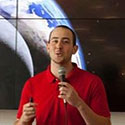
Master's Student, College of Charleston
Zack Proux graduated from Michigan State University in 2016 with a B.S. in Zoology and is currently entering the second year in the Marine Biology Masters program at the College of Charleston. His thesis research focuses on combining seafloor mapping data with known locations of deep-sea coral occurrences to build predictive distribution models for two genera of deep-sea corals (Lophelia and Leiopathes). On this expedition, Zach will be helping with multibeam mapping operations. Zack grew up in Glenview, Illinois, a suburb of Chicago, and resides in Charleston, South Carolina.